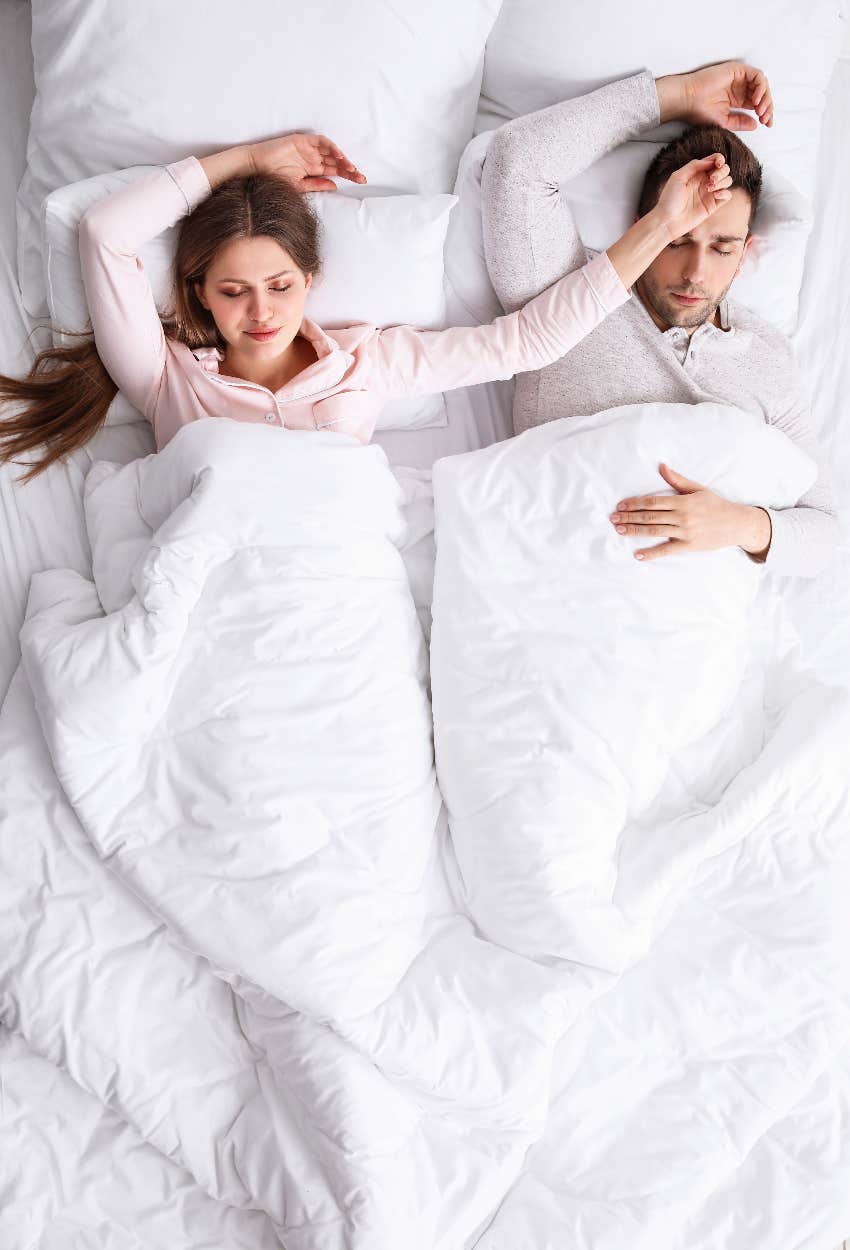How The German 'Doppelbett' Sleeping Method Helps Couples Actually Get A Good Night's Rest & Avoid 'Sleep Divorce'
It won't solve your partner's snoring problem, but it takes care of pretty much everything else.
 New Africa | Shutterstock
New Africa | Shutterstock Personally, my greatest fear about marriage is not commitment or conflict, it's being required to share my bed with another person for the rest of my life. "Get away from me and go sleep in the guest room" will be part of my wedding vows, and that is a promise!
But perhaps it doesn't need to be. A long-held German method for couples sleeping is becoming increasingly popular, and it might just be the solution to the worst parts of sharing a bed, especially if you're the type who likes to sprawl out like a starfish and resents the very suggestion you do otherwise (hypothetically!).
The German 'doppelbett' sleeping method helps couples get better rest without sleeping separately.
I have a friend whose motto in her single days was, "I'm not a stayer," meaning that if she went home with a dude from the bar, she immediately went back to her place afterward to sleep in her own bed. When some guy tried to sweetly murmur, "Why don't you stay?" she'd immediately respond, "Oh, I'm not a stayer" and that was that.
She now sleeps not only with her husband but often with her three children under five who rarely give her a moment's peace, but still, her approach is understandable! For many of us, sharing a bed is a one-way ticket to laying awake all night, every night — and it's happening to far more of us than we probably realize.
A majority of couples say their partner keeps them up at night, and 'sleep divorce' is increasingly common.
A 2024 survey of 2,000 couples by experts at UK mattress retailer MattressOnline found that 82% of couples are kept up regularly by their partner's sleeping habits, and the biggest reason, of course, is snoring. But tossing and turning, stealing the covers, and my personal favorite practice, "starfishing" across the bed, were among the most common complaints, too.
And a LOT of partnered people are giving up on bed-sharing because of it. The survey found that 21% of couples had initiated a "sleep divorce" — sleeping in their own bed in their own room away from their beloved's untenably annoying habits. (It's the breathing for me. Why do you breathe like that?! What are you doing over there, running a 5K? Shut up!)
 Pixel-Shot | Shutterstock
Pixel-Shot | Shutterstock
Some studies, like one last year by the American Academy of Sleep Medicine, place the number even higher, at more than a third of American couples. But what if there's an even better way that splits the difference between sharing a bed and locking yourself in the guest room? That's where the Germans come in.
The German 'doppelbett' practice involves two entirely separate beds in one frame.
The Germans always seem to have a solution for everything, and this is no exception. "Doppelbett" literally means "double bed" in German, but not in the sense we're used to — it's quite literally two separate beds combined on the same bed frame.
We're talking not only two separate sets of covers and bedding, but two entirely separate mattresses, too. No more compromising on softness versus firmness (a godsend for people like me with freakishly wide shoulders who wake up with a migraine if they sleep on anything firmer than a bag of jet-puffed marshmallows), no being jostled around every time your partner rolls over, and no stolen covers. Finally.
MattressOnline's in-house sleep expert James Wilson, aka "The Sleep Geek," pointed out that the benefits go well beyond just not being annoyed by each other — sleep quality can impact everything from mental health to the management of chronic pain.
Good sleep also impacts the relationship itself, of course, since it affects mood. Plus, the "doppelbett" method makes, um, the non-sleeping activities that happen in bed a lot easier to implement than a sleep divorce. "You still share a bed, there’s just a little more personal space," Wilson said. "You can still cuddle when you want … but with more comfort and choice."
Of course, "doppelbett" won't solve the snoring or breathing problem — you're still relegated to rolling over and softly whispering, "I will smother you with this pillow until the light goes out of your eyes if you do not stop that [redacted] wheezing" into your loving partner's ear. But at least you can go back to starfishing beneath the coziness of your own comforter afterward, and that's half the battle!
John Sundholm is a writer, editor, and video personality with 20 years of experience in media and entertainment. He covers culture, mental health, and human interest topics.

